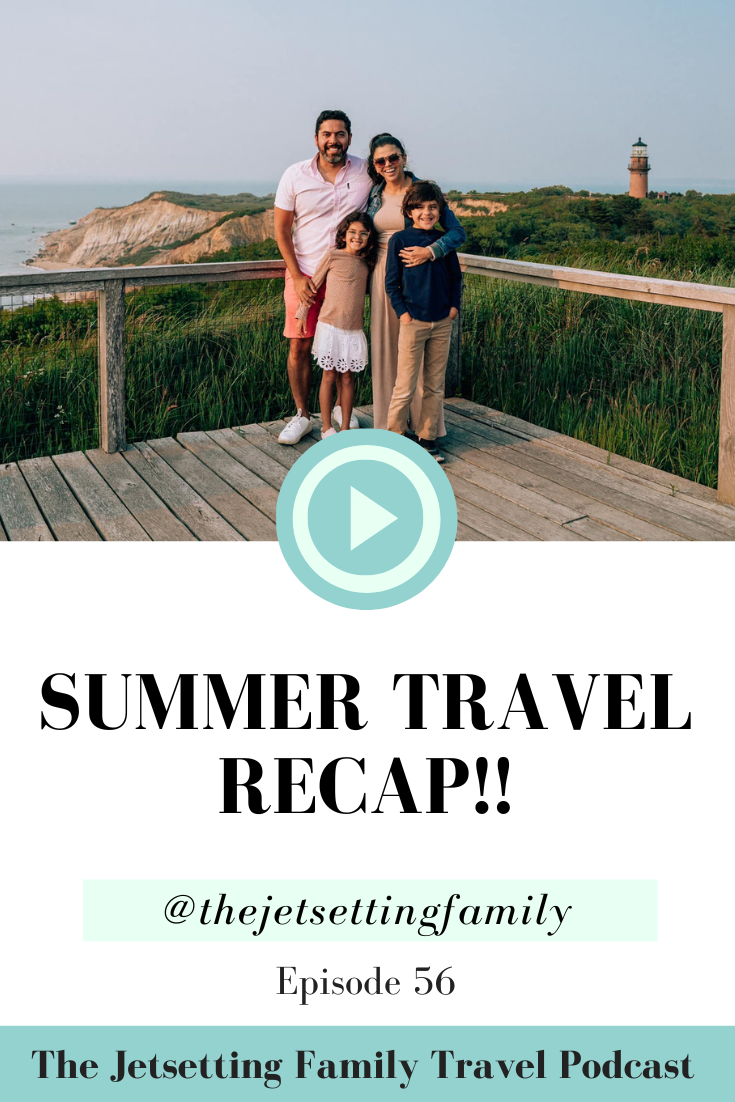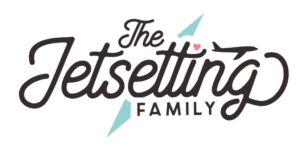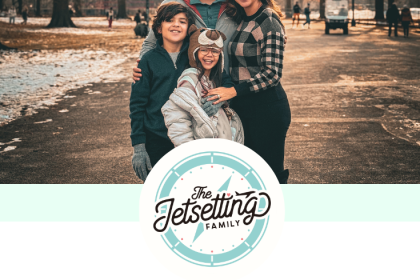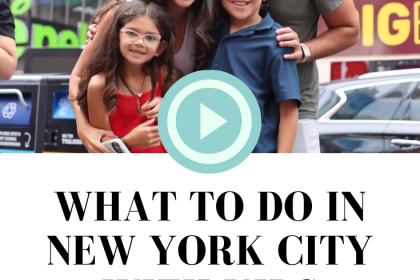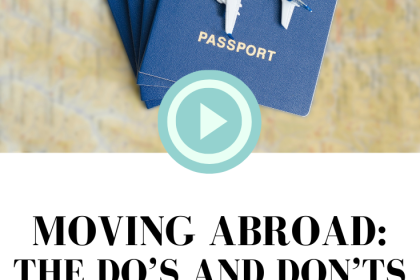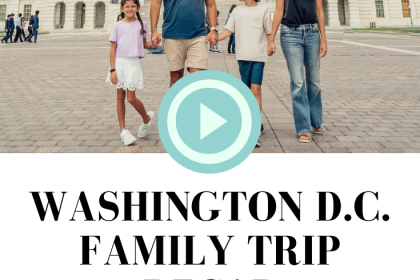After a brief hiatus, we’re back! We had a whirlwind of a summer trip in June, which in total took us through 12 states along the East Coast. Check out this episode to learn where we went, and what we’ve learned about summer travel this year!
Listen and Subscribe on: Apple Podcasts, Spotify, Google Podcasts
Transcript
Rod: Welcome to the Jetsetting Family Travel Podcast. I’m Rod. And I’m Jess. And it’s been a hectic, hectic month of summer travel.
Jess: I know. We’ve been so sorry. We went MIA guys, that was not the original plan. Sometimes life just gets the best of you and I mean, you just have to prioritize. And not that you guys aren’t the priority, but family comes first and we just decided there wasn’t enough time in the day for us to film.
Rod: Yeah. But now that we’re back, we are, we’re excited, we’re recording, and we’ll be back to our weekly Tuesday episode cadence. Starting with today’s episode, which is really a big recap on the month-long summer trip that we had from Texas to all over the East coast, the New England area and back to Florida.
Jess: Yes. So I know we had talked about our summer travels in previous podcast and how we were going to do an enormous road trip. Things changed a little bit. There was still road trips involved, but we actually ended up getting hired for a really cool opportunity and it was to film a Ford commercial. So stay on the lookout guys.
We don’t know all the channels it’s on yet, but. It’s out there. And that ended up being filmed in Texas. So it was supposed to be towards the beginning of our journey, but we ended up flying to Texas instead. We also had just had some family stuff come up, so our trip got postponed by about 10 days, I’d say.
And due to this, we decided we didn’t have time to make the drive from Florida up to New York, like originally planned. But we did fly Texas to New York and then we ended up renting a car for the first two weeks of our trip.
Rod: Yep. And those first two weeks started in Boston, Massachusetts. So here’s, here’s how the overall structure of this trip went. So starting in Texas, we flew into Boston. We spent some time there, went to Plymouth for a day, and then we had a different opportunity for work in Martha’s Vineyard where we worked with a company called Third Home. You might’ve seen some of those posts already on Instagram, but we spent a week there.
We really enjoyed their vacation rental service that we are members of. And we also had friends visiting us from Colorado there.
Jess: Yeah, so from Martha’s Vineyard, absolutely love and need a whole podcast dedicated to that because it was a great, great week. And from there it really didn’t make sense.
But we drew, took the ferry back over to Massachusetts and then we drove to the Catskills, New York. The reason we did that is because the Catskills was supposed to be first on our trip. We’d already found a home. We wanted to stay at there, and we didn’t want to lose out on that opportunity. So it didn’t make sense travel wise, but when we rearranged our schedule, it fell that way. So we went to Catskills and then we went up to Burlington, Vermont to visit a friend, which was amazing. And then we went back to Boston, so it’s a detour, where we got to tour Rod’s college and see a lot of his college friends and it was amazing.
And from Boston, we went to New York City.
Rod: Yep. So at that point we returned the rental car and we realized, all right, let’s try some other modes of transportation. So from Boston, we looked at either flying or taking an Amtrak train or taking a bus. And what we ended up finding was that the bus was significantly more affordable than the train and the flight options. So we took a bus, it was a four and a half, almost five hour drive from Boston to New York City. We got left out at the bus station, took a quick taxi over to our hotel where we spent the next couple of days exploring New York City. That was our first time as a family going to New York, and we also had Jess’s parents come and visit us there.
So we got to explore all over the city. It was an overwhelming three days. And from there then we took a train to Wilmington, Delaware which was an Amtrak train. Super, super nice actually. And we’ll probably talk more about that in these separate episodes. And In Wilmington was the memorial service for Jess’s grandma who passed away back in February.
But this was a great opportunity for all of her family, from her dad’s side to come together and celebrate her grandma’s life.
Jess: Yes, so we got to see a lot of family. It was actually really, really nice, despite being a sad occasion. Just a lot of memories. It was, it was nice. From there, we topped on another train to Washington DC where we finished off our trip before heading home. I’m hoping to do separate co podcast on Martha’s Vineyard, Boston, New York, and DC because each place was very, very, very amazing. But today’s episode’s going to be all about the lessons we learned in our one month of travels this summer, like every summer. We’re every big long stretch of adventure.
We learned some things. Sometimes we’re great at re like applying the lessons we learn and sometimes we’re not. But hopefully you can learn from our, not mistakes, but some of our, I don’t know, preferences.
Rod: Yeah. Things that we learned and you know, I think one of the, the very first thing that we learned was we needed to be super flexible.
We had been planning on having our minivan for the entirety of the month. From driving from Florida all the way to Boston and everywhere in between. And when that changed, then we really scrambled to book rental cars and to book flights to book the trains and the buses. And I think what ended up happening is we, we realized that yeah, the minivan.
While it might have been convenient to have it around if we needed to drive places, once we were in these big cities, there was really no need for us to be driving. And we would’ve been paying some really, I would say, outrageous parking fees for putting the van there for like $50 a night. Which, you know, for us, we were able to put those costs into the stay at the hotels and to experiences and all of that stuff.
So once we realized that we weren’t going to have the minivan, then we were able to adjust and be flexible, but that also gave us the freedom to be able to adjust things as we needed to.
Jess: Yes. A part of me was sad. We didn’t have our little rocket ship with us, our little minivan, only because we had to pack for different climates.
There was, you know, Texas was hot, Martha’s Vineyard was cooler. So it would’ve been nice to like be able to leave stuff in the van. Yeah. But besides that, for me, the biggest thing I learned with this summer trip, and it’s been something that we learned actually when we toured Europe and we did the Eurail system, is that three nights anywhere is too short for our family.
I’m not saying it’s too short for you. I think it’s great if you are flying and flying home. Three nights is manageable, but when you’re doing three nights in large action-packed cities back to back, to back, to back to back, what happens is first city goes great, but then you get to the next city tired and you kind of want a rest day.
But you know, you only have a couple full days there. So you jam pack them, and as each city goes, it’s like your excitement to explore that city. I mean, even if you’re excited, you’re so tired that it kind of diminishes to some degree, just, it’s just too jam-packed. I think for me, six to seven days in a place allows me, or allows our family to not be doing these long, like eight-to-eight days of sightseeing.
You know, you can have a rest day and only go to one thing in the afternoon, or, I don’t know. It’s just a lot easier for me to manage the kids and to make sure everyone. Isn’t overly tired on our adventure and we’re still having time to decompress, like the awesome things we just did so that we can look forward to the next thing.
Rod: Yeah, and I think related to that was also one of the trends that we see when we have these really strong and fast spurts of travel is that at the very end of it, we end up getting sick. Every time we picked up colds or I don’t know, some kind of bug at the end of our trip and as soon as we got home, we just shut down for a couple of days and just needed that time to recover, relax, and recharge the battery so that we can continue to enjoy our summer here in Florida.
Jess: Yes, exhaustion was definitely part of why we probably got sick, but I think something else that was different for us, this trip, I don’t really know if it’s advice, but we’ve mostly done trips to Europe or Southeast Asia or South America. We haven’t done like a big, extensive one month or six-week long US trip. And something that was really different this trip was the amount of people we knew in every place we went. Like Rod is from San Diego, went to college in Boston. I am from Albuquerque or Texas as well. But you know, Rod and I lived together in Colorado. We were military and we’ve just accumulated friends all over the country and we have large families, so there’s a lot of family all over the country.
I think that that’s something going forward if we ever did a trip like this I’d want to do, is we didn’t give people notice because we didn’t even know our schedule. So we were giving people very short notice that we were in town, but I almost wish, even though they were different friends from different circles of life, I would’ve just said on Friday, we are going to this cafe if you’re free.
We’re there, like we’d love to see everyone because we did little meet and greets, like not meet and greets. It was so amazing to catch up with everyone. But it would be like breakfast with someone and lunch with someone, then dinner and it was all these things which were beautiful moments. Catching up with people, but squeezing that into an already like three-day jam-packed trip was hard.
I felt like we didn’t get the quality time with some people we wish we had. To some degree, and I felt like it was just harder to arrange. And I think we didn’t really factor that in into these short trips because we don’t know anyone in Southeast Asia. We don’t really know anyone, anyone in South America.
So when we’ve traveled to those places, all these little meetups were not a factor.
Rod: Yeah. Yeah. And I think going hand in hand with that is when you’re traveling so quickly and you have to have flexibility and all of a sudden, you’re planning in additional kind of hangouts with people, then it does, it does get overwhelming to an extent.
But also, you feel bad when you don’t get to see everybody because you didn’t schedule enough time in those locations. So, big lesson learned for us, I think it’s very combined with planning more time in less places rather than three days in a bunch of places, just so we could see a lot. And one of the other things that we learned is in terms of, I think it was great being able to have flexibility to make changes to our plans when we need to, but there were some things that were pretty rigid and, we were also weren’t able to do because we couldn’t get reservations.
So for example, when we took the ferry to Martha’s Vineyard, thankfully we had already booked it several weeks in advance because we were planning on having our minivan there. So when that changed and we started looking at, okay, so if we need to change the dates for when we’re taking that car ferry across to Martha’s Vineyard from Massachusetts, we started seeing that there was hardly any availability.
So things did get a little bit more rigid there. Thankfully, we still were able to take the rental car on the dates that we had already scheduled for the minivan, but if we had made changes for a couple of days, or if we had decided to leave either earlier or stay later, Then that opportunity might not have been there for the rental car, which would’ve put us in a really weird situation of either keeping the rental car in Massachusetts for a full week or keeping it in Martha’s Vineyard for some time until we were able to find availability to send it back, because that was the start of their busy season.
And things started getting pretty hectic at Martha’s Vineyard and on the ferry schedules for those last couple of days. Likewise, with Washington DC when making reservations, most of the museums there are free and you don’t need reservations for, but once there are some that are very popular, like the Air and Space Museum that we had looked into, it’s like, okay. Let’s go into that museum. On our last day. We started looking, saw the reservations were needed. There were no reservations for the next four days. So then we realized, oh, well we kind of missed out on that one because we hadn’t planned it in advance. That’s our bad. But I mean, the. Thankfully we were still able to do a lot of other museums and stuff in the meantime.
Jess: But summer travel, or at least travel in general is back and it’s back strong and things are booked and crazy and packed.
So I do think we got lucky in a lot of sense of planning things at the last minute. And it’s funny because I am not a planner for the most part, but this year I did try to plan things really in advance and I was so proud of myself. I had everything booked. We were good to go, and then our plans changed.
And so a lot of those plans got washed away and we had to reset. But it’s okay. It always ends up working out and we still made it work. Thankfully for us, we’re pretty flexible on modes of transportation. So Rod mentioned we took buses and Amtrak during this trip. And part of that was due to one not having the van and two flights were more costly at the last minute.
And so these were cheaper alternatives that were easy and fast out of the two. I was super impressed with Amtrak. I feel like it’s an unutilized service.
Rod: Oh, absolutely. And it’s so easy. And even, yeah, even our kids were like, why aren’t we going through security when we’re getting into this train? Isn’t that bad?
And we’re like, I don’t think so.
Jess: It made me worry a little bit, but at the same time, it’s like you don’t have to arrive an hour before your departure. A lot of the train stations are like in the hub of a city, so like when we got to Washington, DC like, we’re not at an airport an hour away. We’re in the heart of the city already.
The only negative is, is we did travel heavier than normal this trip. And that’s the one thing, I mean, it’s definitely possible, but it’s a little trickier with luggage because I don’t know, there’s just not like l
Rod: Yeah, there’s not a lot of space. Space for the luggage and having to haul those around. We had three large check-in luggage and four backpacks and a car seat, and we had to plan for hot Texas weather and going straight into cooler New England temperatures in Martha’s Vineyard, back to heat in Washington DC so it was, it was, yeah, we definitely overpacked. We weren’t traveling as light as we usually did, and. On a bus, it’s easy because there’s a bunch of compartments under the bus where you can pack your stuff in the trains.
There’s, you have like those three minutes to scramble on board and find places for all of your stuff somewhere along the compartments there. If you’re in the mid route, so sometimes, so say from New York to Washington DC That was a full itinerary, but we stopped in Wilmington and then from Wilmington to DC that was when we got back on the train, it was already mid route.
So there were a bunch of people already on the train. All the luggage compartments were used up, so we kind of just had to find this like random space right next to the luggage compartment where we can kind of jam stuff into. And yeah, that was, that’s the risk of the train travel. But aside from that, like the seats there are super comfortable.
A lot of the times there’s Wi-Fi, you have separate carts with food and overall, it’s just really smooth.
Jess: Yeah. Another thing to note is we did one Amtrak ride in first class and one Amtrak ride in coach. Yep. I didn’t really notice a huge difference between the two. Did you?
Rod: No. I think the big difference is with.
First class, you have assigned seats. So then you know that you’re going to be able to either sit together or have plans for that. If you go into coach and you go into one of these mid route stops, then you just have to find whatever open seats there are. So if there’s no seats together and you’re all going to be sitting apart, you’re either having to ask other people to move, and then that when you have luggage and specific train carts and everything, then that gets a little bit more complicated.
So, that’s the, I think that is the, the nice thing about first class is having those assigned seats and knowing where it is that you’re going to sit, and having to be able to plan ahead for that.
Jess: Yeah. Overall though, I was really impressed and I actually think that riding the trains, yes. When you look at it like travel time-wise, it looks longer, but like once you factor in getting to an airport an hour and a half early, having to check luggage, usually airports are more remote, so you’re having to actually pay for an Uber to drive you 45 minutes out.
I actually think the training saved us time and it saved us money. So I considered it a win-win.
Rod: Yeah. Yeah. And I think one, and I guess my last thing that I learned is have a backup plan. We had an almost bad story in the making on our return trip from Washington DC back to Florida, and what ended up happening was, this was right before the 4th of July holiday.
On a Friday where the airport was super crowded, flights were fully booked. We got onto our flight, which was Allegiant. That was the first time that we’ve ever flown on Allegiant, and I think it is a budget carrier. So we didn’t know what to expect. We arrived too early where we couldn’t even check in.
And then as soon as check-in opened up, they only had one counter. We were the only flight on Allegiant out of Dulles that day. So that was the initial risk. Well, okay, if something happens, then we need to get rebooked. The flights from Dulles to Jacksonville, were only available on Mondays and Fridays. I don’t think so.
So if we didn’t make this flight, we were either getting stuck in DC or Virginia over the weekend and waiting until Monday, or we’d have to find another flight from a different carrier and then probably pay a really crazy amount on a holiday weekend to be able to fly like last minute. So when we got on the flight, obviously, or of course there were issues, with fueling.
I think they, the staffing at the airport itself was really low, so there was only like one fuel truck and there were a bunch of Southwest flights waiting for fuel. They only had a certain small team that was loading the luggage, so they were late loading luggage too. So two hours into it. Sitting on the airplane, we still hadn’t taken off and we’re like, Ooh, we don’t have a backup plan.
How are we going to get home if we don’t make this one flight? Which we didn’t know was the only flight for that carrier for the whole weekend. So we started scrambling trying to see our rental cars available. Rental cars were not available because it’s already a crazy holiday week. Is there a bus or a train that we can take to Jacksonville?
And after that, I mean, we. We just started going down this rabbit hole of like, oh man, we’re pretty screwed if we don’t take off on this flight. But this was not a bad story. So thankfully the flight did take off, the airplane did get fueled, and we were able to get back home on our original scheduled flight.
Jess: One other thing, I noticed this trip personally that. I don’t know. I guess I’m going to keep in mind for future trips and I don’t know if it’s because I’m pickier because I’m used to my home base now or if it’s because the kids have grown up and we all just need more space. But I noticed two things, I guess I’ll say two.
One, these hotel rooms say queen beds. A lot of them are double beds.They aren’t true queen beds. So if this is something that I’ve now realized bothers me, I need to pay more attention when I’m booking, is it a queen bed or a double bed? Because let me tell you, sleeping on a double bed with your family for three weeks.
It isn’t ideal. None of us slept well. It was a pain at the very end. When we got to DC, we finally decided to try a king bed with the pullout couch and feel like all of us slept so much better because the pullout couch was a queen bed. And then Rod and I had a king bed. But a double bed is a. I mean, just a lot tighter if you’re not used to it to be sharing.
Rod: Yeah, and I think it’s also now that our kids are bigger, you know, when we started traveling full-time, there were two and five. Now they’re seven and 10, and it’s not as, comfortable when you have to shuffle. When one of us is sleeping with one of the kids and one of the kids is moving around. So it makes it harder in that smaller bed with more grownup kids.
Jess: At this point, I’ll prioritize two queen beds or a king and a sofa at this point. And I also think that’s something else I learned is, I mean, we were on the road for, what, five weeks? And in the past, we’ve mostly done, I’d say mostly Airbnbs, unless it was like a one week sponsored trip where it’s like to and from home.
And I think that’s very different than being on the road for an extended period of time. And this was one of the first trips where we predominantly did hotels except for we started with a Third Home. And in the Catskills we did a Third Home. And I mean, those are enormous, spacious places where I slept like a queen.
But besides that ex, I’ve just noticed the extended hotels, especially now that the kids are older, they want a little privacy. I just think for every, you know, one time hotel stay, we do better with an Airbnb break where like the, there’s just more space for us to spread out. Not to say I wouldn’t do a trip like this again with all hotels.
It always comes down to budget. But if I could and financially it ended up working out the same. This trip, we mostly use points, which is why we stayed at hotels. But if not, if I’m paying out of pocket, I’m paying money. I think spend the money at a hotel. If it’s a special hotel, maybe it’s inside a national or like it’s inside a park.
Like the Geyser Hotel in Iceland at the Geysers. Yeah. Or maybe it has a kids’ club or something special. But if it’s just like a room in the heart of a city, maybe look for a two bedroom, Airbnb that might be similar in price range, but give you a little bit more space.
Rod: Yeah, I think the price range thing and the location was the big driver for us too, because we also, we were staying in the big cities that we hadn’t visited as a family before and we knew we weren’t going to be spending a lot of time in the hotel room.
So at that point we prioritize location really. Above everything else.
Jess: But there were Airbnbs that were bigger for around the same price range.
Rod: Okay. But we were using points. Yeah. Since we had points then I guess that was the other big driver of it.
Jess: But I do think, like, especially if you’re gone for three weeks, I would break some of that up, if possible, with an Airbnb in the middle, because by the end of the trip, I love my family.
I love Rod, I love the kids. I told Rod, I’m like, I don’t know if it’s mean to me. But like I just want to go home and sit in a room by myself for two days because the five, like the four of us, have been in a bedroom together and exploring together nonstop connected at the hip for five weeks straight, which I don’t know, I love everyone, but.
It gets a lot. Whereas in an Airbnb, it’s like someone can be in the living room, someone can be in the bedroom. I mean you have these small breaks and so maybe because I just get exhausted quicker that like I’m an extrovert, but I like need reset time. I did find that to be a lot this trip.
Rod: Oh yeah. Yeah. I think we are very thankful for our home and the amount of space that we have back home here too.
Just cause after staying in these like. 200 to 300 square foot hotel rooms with all these, all these bags and all of us, yeah, it got, it got pretty cramped.
Jess: And maybe part of it too is just like location base. Like maybe had we been in Iceland where like during the day you aren’t amongst like chaos and like city life and hustle and bustle.
So like your brain like rests a bit like you could hike or you could go on a kayak and you have these down moments. Maybe it wouldn’t have. Affected me as much, but in a city it’s like you’re trying to make sure your kid’s not getting run over. You’re like weaving through traffic. There’s just constant input.
Stimulation, yeah. And stimulation that like you get back to the hotel room and I’m ready to like decompress. And it’s like the four of us in this 200 square foot room. It’s like, ahhh. So I think that actually surprised me that especially after all of our travels, I did feel more mentally exhausted this trip.
Rod: Yeah. Yeah. Well, with that, I think the plan going forward for us is we will have separate episodes on each of these locations that we visited this summer. If there’s something in particular or recommendations that you’re looking for, whether it comes to DC. Boston, New York, Vermont, Wilmington, Delaware. We spent a little bit of time in Austin, Texas to explore for one afternoon, so we might not have a lot of things there, but yeah, we could have a separate episode on what the commercial filming experience was like because that was pretty unique.
And then we will have a separate episode also on our Third Home experience. And what was it like renting a third home, which was pretty awesome if, I you were to give a spoiler alert. Yeah. Loved it. Uh, but yeah, those are, those are the next weeks and what’s that’s looking like. So if you want to continue to follow along on this journey, then make sure that you’re subscribing.
That way you get notifications every time we put on new episodes, which will be on Tuesday. But otherwise, sorry again for the month plus long gap in episodes, but we were busy having some crazy adventures, and now we’re excited to be able to share more of the details on this podcast and on following episodes.
So with that, thanks again for listening, and until next time, Happy Jetsetting!
